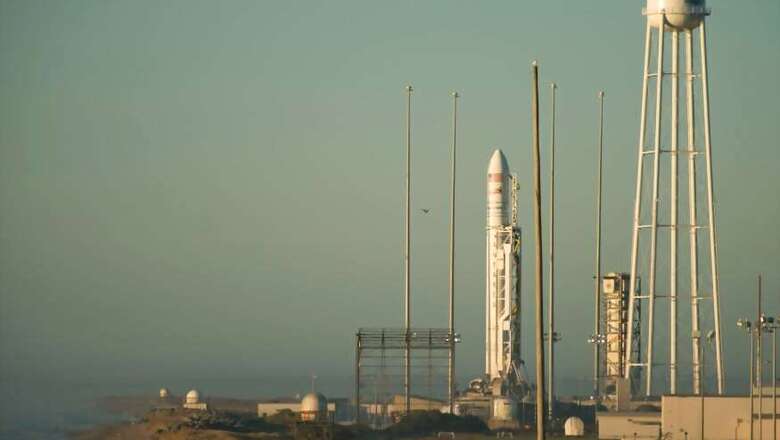
views
US aerospace firm Orbital ATK launched its sixth resupply mission carrying NASA cargo to the International Space Station (ISS) using an upgraded Antares rocket almost two years after its predecessor exploded on lift-off.
The two-stage booster, powered by new engines from Russia and carrying a Cygnus cargo ship, blasted off on Monday at 7.45 p.m. EDT (5.15 a.m Tuesday, India time) from Virginia's Wallops Flight Facility.
"It's great to see launches to the International Space Station happening again from the Virginia coast - and it shows what can be accomplished with a close partnership of federal and state agencies, along with the U.S. industry, all working together," said NASA Administrator Charles Bolden.
Under NASA's commercial resupply services contract, Cygnus carried about 2,400 kg of supplies and science experiments for the ISS, Xinhua news agency reported.
Cygnus was also carrying a new station research facility that will enable a new range of research experiments by allowing precise control of motion aboard the ISS.
One of the experiments is Saffire II, which studies how flames grow in space.
The cargo aboard the Cygnus will support dozens of new and existing investigations, NASA said.
Also onboard were lighting systems studying the effect of lighting on sleep and daily rhythms, a tablet app collecting health-related data and a new way to measure neutrons as a part of the radiation exposure experienced by crews during spaceflight.
Astronauts aboard the space station are exposed to space radiation that can reduce immune response, increase cancer risk, and interfere with electronics.
"The Fast Neutron Spectrometer investigation will help scientists understand high-energy neutrons, part of the radiation exposure experienced by crews during spaceflight, by studying a new technique to measure electrically neutral neutron particles," NASA said.
If all goes well, Cygnus will arrive at the ISS on October 23, where it will stay for about five weeks.
The Cygnus spacecraft will remain at the space station until November before its destructive reentry into Earth's atmosphere, disposing of about 1,360.7 kg of trash, according to NASA.
This resupply mission marked the first flight of the upgraded Antares 230 vehicle, and the first launch from Wallops since an Antares rocket and its Cygnus resupply vehicle were lost seconds after lift-off in October 2014.
Virginia-based Orbital ATK is one of two US companies that provide ISS cargo services for NASA, the other being SpaceX.

















Comments
0 comment